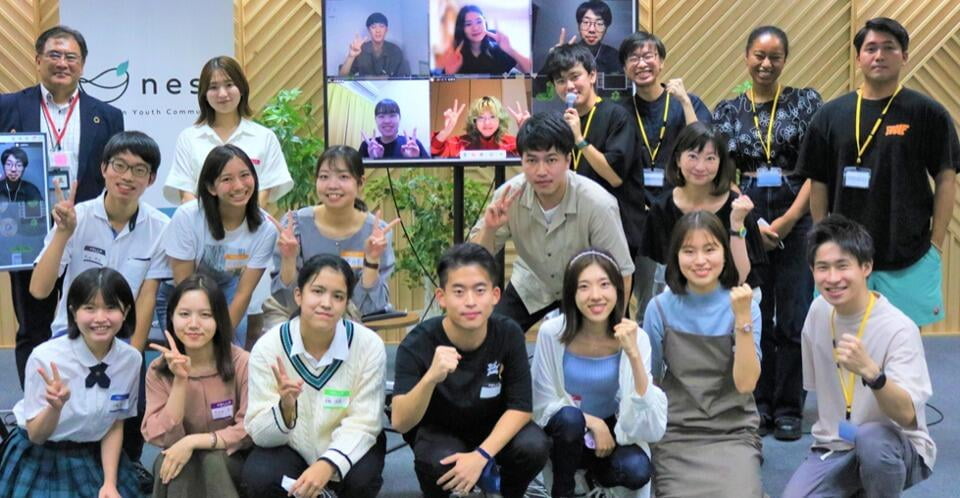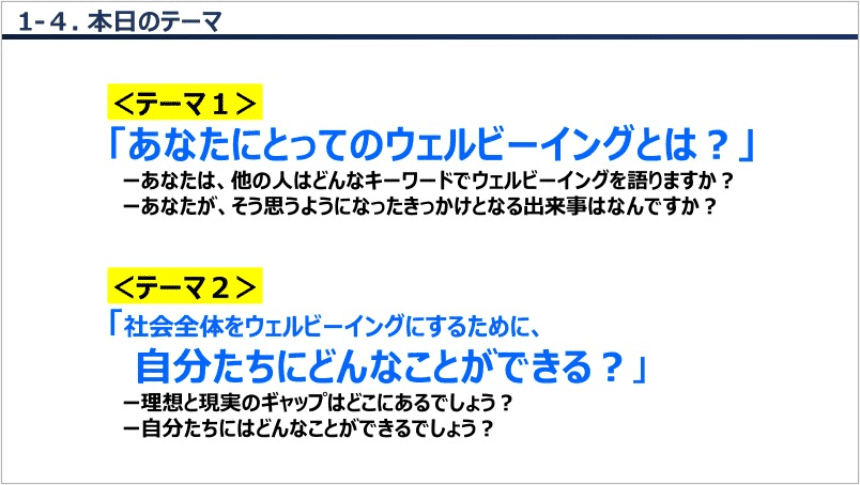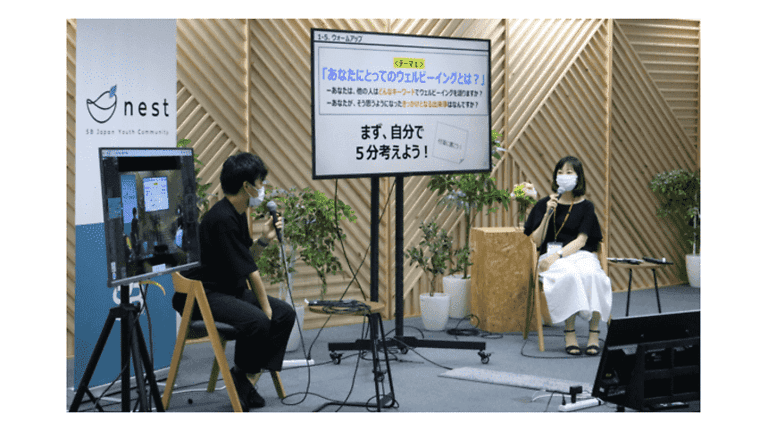2022.12.19
Gen Z participants considered various types of well-being in a well-being workshop
The keyword “well-being “has become ubiquitous. The vision contained in the SDGs Declaration states that one of the SDG goals is to create a society where “physical, mental, and social well-being are assured” for all. The term is becoming increasingly popular, but what does the state of well-being in which not only the body but also the mind is fulfilled really mean? What does well-being require? Benesse has been committed to the corporate philosophy of “Benesse” (well-being) since 1990 and through various businesses has been supporting the concept of living well on one’s own terms. The Company recently held a workshop to consider well-being on a personal level. The next generation of young people who will shape the future in times of great change participated in the workshop and engaged in lively discussion. We asked the person in charge of setting up this workshop about what she realized from conducting the workshop and her thoughts behind the planning.
※Benesse is a word coined from the Latin words "bene" (well) and "esse" (being), or “well-being” in English.

What is well-being? A workshop to confront this big question through dialogue
The well-being workshop was planned and designed by Benesse Holdings and co-sponsored with Sustainable Brands (a global community of sustainability leaders). The event was attended by members of "nest (SB Japan Youth Community)”, a community of Generation Z changemakers who think about social issues and disseminate ideas.
Held in September 2022 as an online and in-person hybrid event, the workshop brought together a diverse group of young people, including those living overseas, high school students, current college students, and those who have entered the work force. The workshop began by asking the participants if they were familiar with “well-being”, the theme of this workshop. Most participants raised their hands. Once again, I was struck by the pervasiveness of the keyword "well-being". Then we came to the main theme.
The workshop started by forming groups of several people to think about what well-being means to them individually, put that in words, and share their thoughts with their peers. The groups were shuffled many times along the way with repeated discussions, exposing the participants to diverse perspectives and values, and little by little the vague and broad concept of well-being was unraveled and verbalized into concrete keywords.

Each and every member of society should be respected and be able to live on their own terms. A “third place” where one can continue to be oneself

In Theme 1 “What does well-being mean to you?”, each participant reflected on their own experiences and spoke animatedly about when they felt a sense of well-being. They expressed the following opinions.
“Well-being is a mental state. We are exposed to social networking sites on a daily basis and may feel depressed when we compare ourselves to others without even being aware of it. So how can we maintain our own pace and ensure our peace of mind?”
“Perhaps Japan is too rigid compared to the rest of the world regarding the way things have to be, such as needing to work hard for the sake of others and to keep trying. We need to be free of stereotypes and be selfish about our own feelings sometimes. It is important to be yourself in order to have a sense of well-being.”
Among the many comments, what stood out as a common thread was that everyone referred to a spiritual richness that was not physical or material. Moreover, what resonated the most was the idea of a place where one can be oneself.
“Having a place where you can be yourself may lead to well-being. When people are constrained by the framework of family, school, or work, it is hard for them when they experience a setback. If you think about it that way, you need someone who accepts you, and a third place where you can interact with people to share and resolve your problems.”
Next, in Theme 2 which considered "What can be done to improve the well-being of society as a whole?", the perspective was broadened and participants presented the following opinions.
“Society is a collection of individuals. I think we need to create a world where each diverse individual, the smallest unit that makes up society, is respected more.”
“Having a third place where people can express themselves, connect and expand with other people and society, while increasing respect for the individual. I want to provide such a place for many people including children.”
After the workshop ended, participants commented that “The experience of concentrating on the single theme of well-being was refreshing, and I was reminded of the difficulty of defining terms and of the diversity of ideas" and "It felt good to find well-being with each conversation". From their impressions, it was clear that while they found it difficult to put broad concepts into words and integrate them, the participants felt that the time spent to deepen their thoughts was stimulating.
Becoming aware by asking questions may be the first step toward well-being.

Explaining the day’s plan (Izumi on the right, Haruto Irie, producer of "nest (SB Japan Youth Community)”, on the left)
“In designing this workshop, I was careful to start with the output from having participants put into their own words what well-being means to them and going back to the input which exposed them to various opinions, rather than immediately providing output from the input received. I thought that the process of being stimulated by diverse values to broaden and deepen one's thinking was important.”
“What I realized when I actually conducted the workshop was that everyone knew the term well-being, but they had a hard time verbalizing it. On the other hand, I was impressed by how honestly and freely they talked about their own experiences and what they felt from them. As we saw in the various opinions expressed during the workshop, well-being is different for each person, and there may be no one right answer. However, I felt that by discussing it in a community setting such as this which is different from school, we become aware that there are various types of well-being, which may be one of the tips for living in a state of well-being. With this workshop as a starting point, I wonder what kind of insights will be generated when we broaden the scope and talk with various generations. While sharing discoveries made by asking questions with people from all walks of life, I hope to understand and think about well-being.”
The goal is a society of well-being where each person can "live well" in their own way. Benesse has been pursuing the concept of well-being, and will continue to question what well-being is, and to engage in activities that will help realize this concept.
Information
・nest [SB Japan Youth Community] A platform for Gen Z changemakers
https://www.sustainablebrands.jp/community/nest/index.html(Japanese only)
